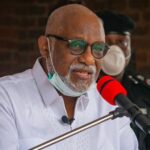The National Human Rights Commission (NHRC), on Wednesday, met with stakeholders to validate Nigeria’s report to the Universal Periodic Review (UPR) of the United Nations Human Rights Council on the human rights situation in the country.
The UPR mechanism of the UN Human Rights Council is a process that reviews the human rights records of all UN member states.
The mechanism, according to the Executive Secretary of the NHRC, Chief Tony Ojukwu (SAN), provides an opportunity for Nigeria to declare actions taken to fulfill her human rights obligations to improve the promotion and protection of human rights in the country.
According to Ojukwu in his address at the one-day meeting held in Abuja on Wednesday, Nigeria’s active participation in the 4th review cycle will provide the Federal Government the opportunity to re-assess its constitutional obligations to, on a regular basis, guarantee the welfare and security of the citizenry.
The NHRC boss said this will task the government and relevant stakeholders to address the root causes of the country’s inequalities, conflicts, and other structural gaps.
He said, “Pursuant to its mandate under the NHRC (Amendment) Act 2010 and mindful of its critical role in ensuring that Nigeria distinguishes herself among the community of nations with respect to international human rights obligations, the Commission prepared its alternative report to provide alternative, credible and reliable information on human rights thematic areas to the UN Human Rights Council”.
Ojukwu said the Commission’s meeting with stakeholders seeks to take a critical look at the Alternative Report to ensure its accuracy and relevance in addressing the realities in the country.
Speaking further on the objectives of the validation meeting, the Director of Civil and Political Rights of the National Human Rights Commission, Mr. Abdulrahman Yakubu, said Nigeria’s state of compliance with its international human rights obligations will be reviewed at the 45th Session of the Human Rights Council UPR 4th Cycle in April/May 2024.
The Independent report prepared by the Commission, he said, examines the situation of human rights in Nigeria between 2019 and 2023, the intervening years between the 3rd review of Nigeria in November 2018 and July 2023 when the report was prepared.
It assesses the response of government, at both the national and sub-national levels, to the challenges of respect for human rights, upholding liberties, tackling poverty, and reducing inequalities in a plural and diverse society with multiple religious beliefs, ethnic groups, and large land masses.
He said, “Performance is measured using international benchmarks, and that particular attention is paid to election management and political process; administration of criminal justice and rule of law; torture, extra-judicial and arbitrary killings; human rights dimensions of addressing insecurity and violent extremism; rights of women and children; enjoyment of economic, social and cultural rights, including poverty reduction and tackling inequalities and protection of vulnerable communities.”
He called for strengthening accountability institutions in the country to ensure compliance with government rules and regulations in the execution of policies and programs.
READ ALSO FROM NIGERIAN TRIBUNE
WATCH TOP VIDEOS FROM NIGERIAN TRIBUNE TV
- Let’s Talk About SELF-AWARENESS
- Is Your Confidence Mistaken for Pride? Let’s talk about it
- Is Etiquette About Perfection…Or Just Not Being Rude?
- Top Psychologist Reveal 3 Signs You’re Struggling With Imposter Syndrome
- Do You Pick Up Work-Related Calls at Midnight or Never? Let’s Talk About Boundaries







